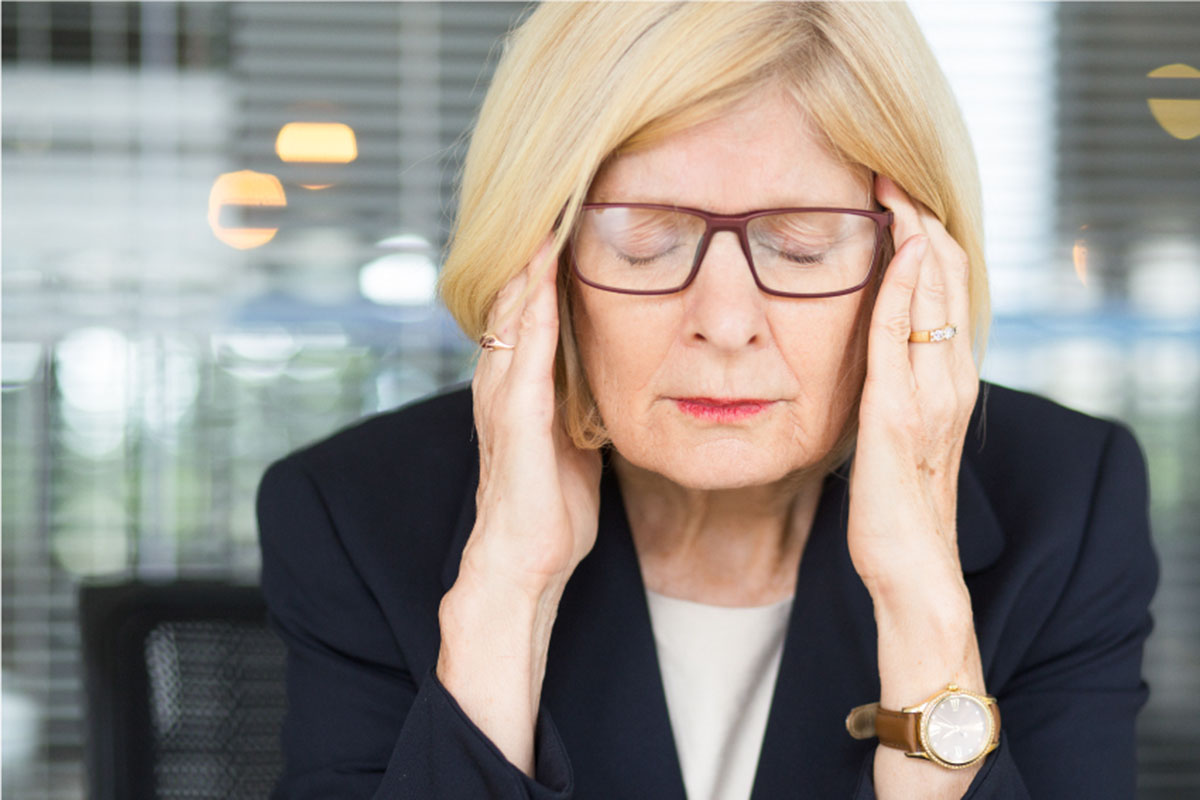Endometriosis is a chronic, and painful, condition in which the tissues that are supposed to line the uterus grows in other areas. The ovaries, fallopian tubes, bladder, bowels, and abdominal cavity can all be affected. This extrauterine endometrial tissue waxes and wanes with the menstrual cycle, just like the endometrium within the uterus does. With no way to exit the body, however, these tissues stick around — leading to inflammation, the formation of scar tissues, and pain.
Why does endometriosis continue beyond the menopause?
Some women have endometriosis for years without knowing it, because they do not experience symptoms — and the fact that they didn't know they had the condition in turns means they have not had the chance to explore treatment options. In this case, endometrial lesions may remain present after the woman enters the menopause.

Even women who have had laparoscopic surgery for endometriosis can see a recurrence beyond their reproductive years, meanwhile, and some women without a history of endometriosis earlier in life may develop the condition after they have entered the menopause. The good news is that endometriosis is usually less aggressive after the menopause — your endometrial lesions will almost certainly be smaller and less active.
More severe symptoms could be triggered by higher levels of estrogen, however, and in post-menopausal women, hormone replacement therapy and phytoestrogens (estrogen-like chemicals from plant sources) are usually the cause. Phytoestrogens act on the uterus and the rest of the reproductive system in a similar way to estrogen, and that means endometrial tissues have the (dubious) chance to proliferate. Over-the-counter hormone products and even the food you eat therefore often play a large role in explaining why endometriosis persists into the menopausal years. Not all post-menopausal women with endometriosis have been on hormone replacement therapy, however.
Does a natural or surgically-induced menopause typically relieve endometriosis symptoms?
Yes, often. Endometrial growth is estrogen-dependent, after all, and the menopause causes a great reduction in your levels of estrogen. Estrogen isn't completely out of the picture even after the menopause, on the other hand, so your relief may not be complete. The menopause is also well-known to introduce its own set of unpleasant symptoms:
- Hot flashes
- Mood swings
- Chills
- Night sweats
- Disordered sleep
- Vaginal dryness
- Metabolic changes and resulting weight gain
Women with endometriosis who are considering surgeries that induce a surgical menopause (hysterectomy, oophorectomy) should know that a surgically induced menopause can lead to especially unpleasant menopausal symptoms. They may then turn to hormone replacement therapy — both to decrease their odds of developing osteoporosis and to reduce their symptoms — which can reactivate remaining endometrial lesions within the abdominal cavity.
Endometriosis beyond the menopause: Your treatment options
Studies of women with diagnosed or suspected endometriosis who have been through the menopause looked at the pros and cons of hormone replacement therapy in this category of patients, and made it clear that the decision to use HRT should be considered very carefully, based on factors like the patient's age, the severity of their endometriosis prior to the menopause, other conditions they may suffer from, their family medical histories, and their weight.
If you are currently considering hormone replacement therapy, be aware that:
- Doctors will often recommend combined hormone replacement therapy as opposed to estrogen-only HRT, but progesterone treatment is associated with a higher risk of breast cancer.
- Endometriosis patients who undergo an oophorectomy (removal of the ovaries) may notice an increase in their symptoms if they then start on hormone replacement therapy.
- Symptoms of mild endometriosis often subside after the menopause, while more severe endometriosis is likely to stick around, especially if the patient has suffered from it for decades.
- The danazol, GnRh analogues and progesterone that are often prescribed to endometriosis sufferers in their reproductive years do not seem to be of help to post-menopausal women with endometriosis.
- Photo courtesy of SteadyHealth.com
- www.health.harvard.edu/press_releases/symptoms_of_endometriosis
- www.mdedge.com/obgyn/article/140415/gynecology/endometriosis-after-menopause-weigh-treatment-risks
- endometriosisassn.org/endometriosis_resources
- www.ncbi.nlm.nih.gov/pmc/articles/PMC4264277/
- jmedicalcasereports.biomedcentral.com/articles/10.1186/1752-1947-3-135


Your thoughts on this